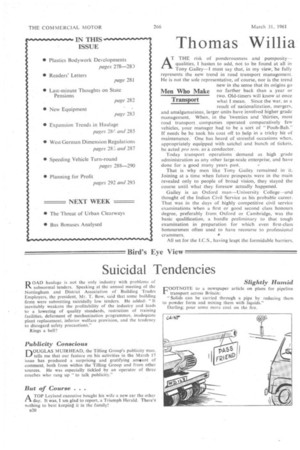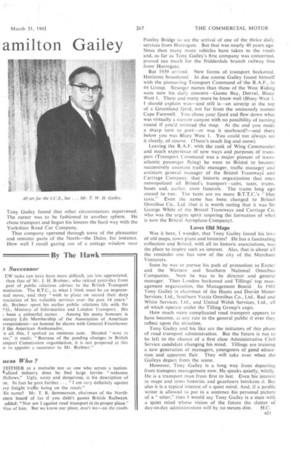Thomas Willia
Page 24

Page 25

If you've noticed an error in this article please click here to report it so we can fix it.
amilton Galley ATTHE risk of ponderousness and pomposity-qualities, I hasten to add, not to be found at all in Tony Gailey—I must say that, in my view, he fully represents the new trend in road transport management. He is not the sole representative, of course, nor is the trend new in the sense that its origins go no farther back than a year or two. Old-timers will know at once what I mean. Since the war, as a result of nationalization, mergers, and amalgamations, larger•units have involved higher grade management. When, in the 'twenties and 'thirties, most road transport . companies operated comparatively few vehicles, your manager had to be a sort of "Pooh-Bah." If needs be he took his coat off to help in a tricky bit of maintenance. One has heard of stressful occasions when, appropriately equipped with satchel and bunch of tickets, he acted protein, as a conductor.
Today transport operations demand as high grade administration as any other large-scale enterprise, and have done for a good many years past. •
That is why men like Tony Gailey remained in it. Joining at a time when future prospects were in the main revealed only to people of broad vision, they stayed the course until what they foresaw actually happened.
Gailey is an Oxford man—University College—and thought of the Indian Civil Service as his probable career. That was in the days of highly competitive civil service examinations when a first or good second class honours degree, preferably from. Oxford or Cambridge, was the basic qualification, a hurdle preliminary to that tough examination in preparation for which even first-class honoursmen often used to have recourse to professional
crammers. • All set for the I.C.S., having leapt the formidable barriers,
Men Who Make Transport
Tony Gailey found that other circumstances supervened. The career was to he fashioned in another sphere. He chose transport and began his lessons the hard way with the Yorkshire Road Car Company.
That company operated through some of the pleasanter and remoter parts of the North—the Dales, for instance. How well I recall gazing out of a cottage window near
PateIey Bridge to see the arrival of one of the thrice daily
services from Harrogate. But that was nearly 40 years ago. Since then many more vehicles have taken to the roads and, as far as Tony Gailey's first company was concerned, proved too much for the Nidderdale branch railway line from Harrogate.
But 1939 arrived. New forms of transport beckoned. Horizons broadened. In due course Gailey found himself with the pioneering Transport Command of the R.A.F., in 44 Group. Stranger names than those of the West Riding were now his daily concern—Goose Bay, Dorval, Bluey West I. These and many more he knew well (Bluey West I. I should explain was—and still is—an airstrip at the top of a Greenland fjord, not far from the ominously named Cape Farewell. You chose your fjord and flew down what was virtually a narrow canyon with no possibility of turning round if you'd misread the map. At the end you made a sharp turn to port—or was it starboard?—and there below you was Bluey West I. You could not always see it clearly, of course. (There's much fog and snow).
Leaving the R.A.F. with the rank of Wing Commander and much experience of new ways and purposes of transport (Transport Command was a major pioneer of transatlantic passenger flying) he went to Bristol to become successively assistant traffic manager, traffic manager and assistant general manager of the Bristol Tramways and Carriage Company, that historic organization that once monopolized all Bristol's transport—cabs, taxis, trams, buses and, earlier, even funerals. The trams long ago ceased to run, The taxis are no more B.T.T.C's "blue taxis." Even the name has been changed to Bristol Omnibus Co., Ltd. (but it is worth noting that it was Sir George White of the Bristol Tramways and Carriage Co. who was the urgent spirit inspiring the formation of what is now the Bristol Aeroplane Company), Laves Old Maps Was it here, I wonder, that Tony Gailey found his love of old maps, town plans and histories? He has a fascinating collection and Bristol, with all its historic associations, was the place to inspire such an interest, Alas, that is about all the reminder one has now of the city of the Merchant Venturers.
Soon he was to pursue his path of promotion to Exeter and the Western and Southern National Omnibus Companies. Now he was to be director and general manager. Then London beckoned and Tillings' top management organization, the Management Board. In 1961 Tony Gailey is chairman of the Hants and Dors'et Motor Services, Ltd., Southern Vectis Omnibus Co., Ltd., Red and White Services, Ltd„ and United Welsh Services, Ltd., all of which operate under the Tilling Group's aegis.
How much more complicated road transport appears to have become, at any rate to the general public if ever they reflect upon the situation.
Tony Galley and his like are the initiators of this phase of road transport administration. But the future is not to be left to the chance of a first class Administrative Civil Service candidate changing his mind. Tillings are training a new generation of managers, youngsters of good education and apparent flair. They will take over when the Gaileys depart from the scene.
However, Tony Gailey is a long way from departing from transport management now, He speaks quietly, wittily. He is a transport man from first to last, Even his interest in maps and town histories and gazetteers betokens it. But also it is a typical interest of a quiet mind. And, if a profile writer is allowed to put in a sentence his personal picture of a "sitter," then I would say Tony Gailey is a man with a quiet mind whose vision of the future the clutter of
day-to-day administration will by no Means dim. H.C.








































































































